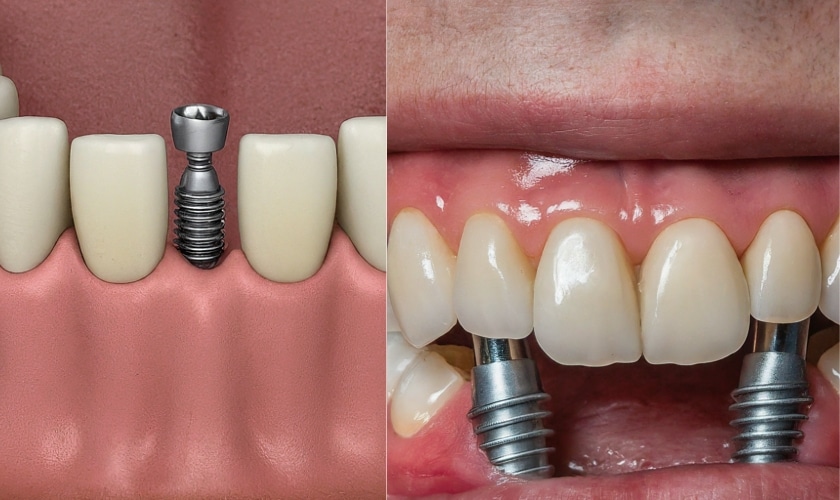The Role of Portion Control in Building Healthy Eating Habits for Children
Portion control makes the children see the line between being hungry and overeating. Parents can ach...

Dental implants have become one of the most effective solutions for replacing missing teeth, offering both functional and aesthetic benefits. They provide a permanent solution that looks and feels like natural teeth while preserving jawbone health. For individuals considering this treatment, understanding the options, costs, and recovery process is essential. Seeking professional guidance from Dental Implants in Abu Dhabi ensures a safe and successful outcome tailored to individual needs.
A dental implant is a titanium post surgically inserted into the jawbone to act as an artificial root for replacement teeth. Once the implant integrates with the bone, a crown, bridge, or denture is attached to restore functionality and appearance. Unlike removable dentures, implants provide a stable foundation, enabling patients to eat, speak, and smile without discomfort or slipping.
There are several types of dental implants available, each suited to different dental conditions and patient preferences:
Endosteal Implants: These are the most common type, placed directly into the jawbone, and can support single crowns, bridges, or full dentures.
Subperiosteal Implants: Positioned under the gum but above the jawbone, these are typically used for patients with insufficient bone height.
All-on-4 Implants: A full arch of teeth can be supported with just four implants, providing a cost-effective solution for complete tooth replacement.
Zygomatic Implants: Used in cases with severe bone loss, these implants anchor into the cheekbone instead of the jawbone.
The dentist will recommend the most suitable option based on oral health, bone structure, and aesthetic goals.
The cost of dental implants in Abu Dhabi varies depending on several factors:
Number of Implants: Single implants are less expensive than multiple implants or full-mouth reconstruction.
Type of Implant and Materials: Premium materials such as zirconia crowns or specialized titanium posts may increase costs.
Additional Procedures: Bone grafting, sinus lifts, or gum treatments can add to the overall expense.
Clinic Reputation and Technology: Clinics offering advanced imaging, digital planning, and experienced surgeons may charge higher fees.
While dental implants may represent a significant upfront investment, their longevity and benefits often make them a cost-effective long-term solution.
The dental implant process involves several stages to ensure stability, aesthetics, and function:
Consultation and Assessment: A thorough dental examination, including X-rays or 3D scans, helps determine the patient’s suitability for implants.
Treatment Planning: A personalized plan outlines the type of implant, placement strategy, and expected timelines.
Surgical Placement: Under local anesthesia or sedation, the implant is inserted into the jawbone.
Healing and Osseointegration: Over a few months, the implant integrates with the jawbone, providing a strong foundation.
Abutment and Crown Placement: Once healed, an abutment is attached, followed by a custom-made crown to restore function and aesthetics.
This step-by-step approach ensures a reliable and natural-looking outcome.
Recovery from dental implant surgery requires careful attention to oral hygiene and lifestyle habits:
Immediate Care: Mild swelling and discomfort are common. Over-the-counter pain medication and cold compresses can help.
Oral Hygiene: Brush gently, floss carefully, and rinse with an antibacterial mouthwash to prevent infection.
Diet: Stick to soft foods initially and avoid chewing hard or sticky items near the implant site.
Follow-Up Visits: Regular checkups are necessary to monitor healing and ensure proper implant integration.
Most patients can resume normal activities within a few days, but full healing and osseointegration typically take three to six months.
Dental implants offer several advantages over traditional tooth replacement methods:
Durability: With proper care, implants can last for decades.
Aesthetic Appeal: Custom crowns match natural teeth in shape, size, and color.
Preservation of Jawbone: Implants stimulate bone growth, preventing bone loss and maintaining facial structure.
Improved Oral Function: Implants restore natural biting and chewing capabilities.
Enhanced Confidence: A complete, natural-looking smile improves self-esteem and quality of life.
Dental implants in Abu Dhabi provide a reliable, long-lasting, and aesthetically pleasing solution for missing teeth. By understanding the types of implants, associated costs, procedural steps, and recovery process, patients can make informed decisions and achieve optimal outcomes. Consulting an experienced dental clinic ensures personalized care and professional guidance, allowing individuals to regain both oral functionality and a confident smile.